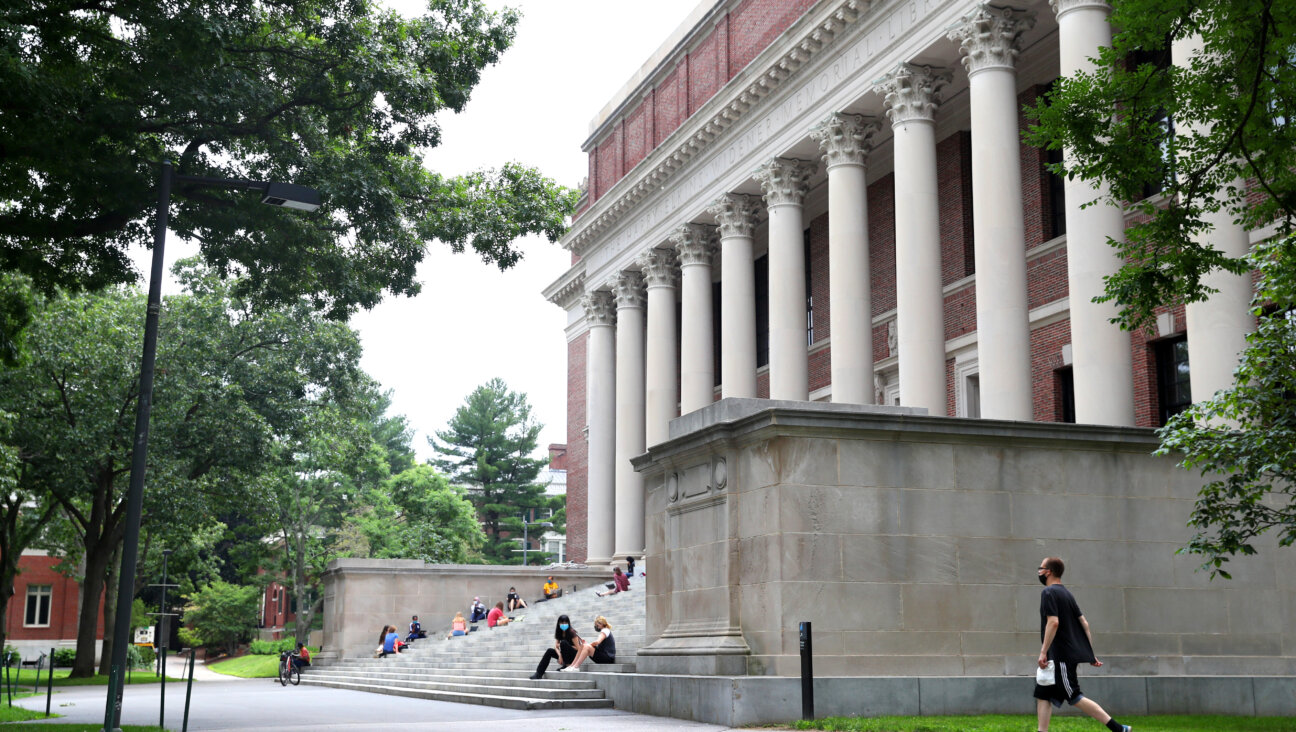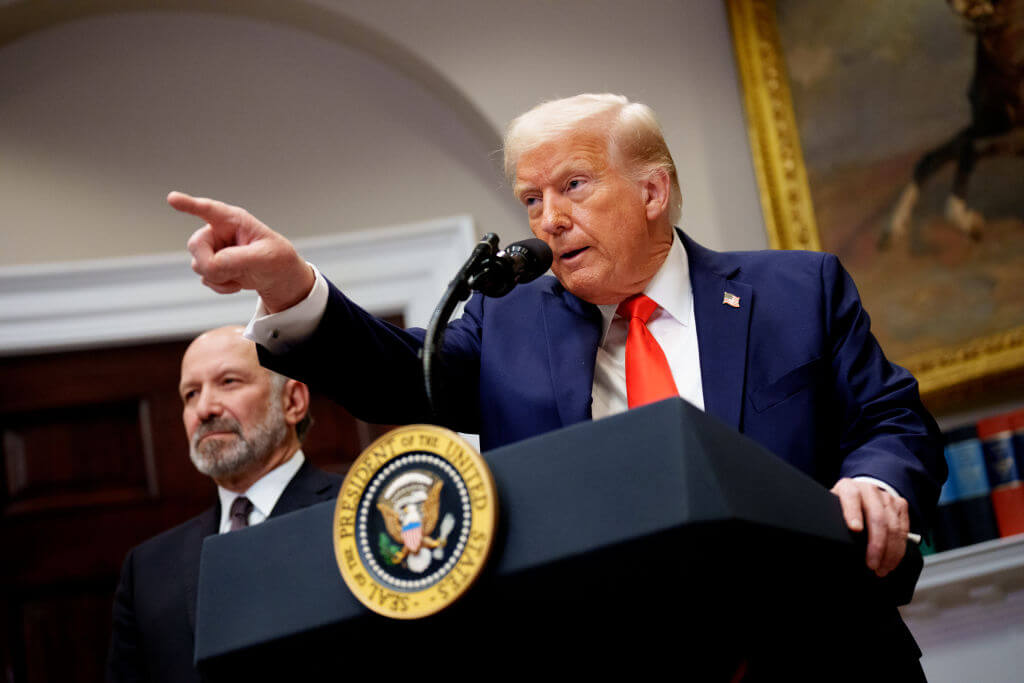Talk of British Boycott Silences Voice of Scientific Cooperation
For the better part of four decades, theoretical physicists Abdus Salam and Steven Weinberg proved that science can bridge cultural divides. When they won the Nobel Prize in physics in 1979, their children danced together in Stockholm, and the Pakistani Muslim and the American Jew stayed friends until Salam’s death in 1996.
It was only natural, then, that Weinberg, 74, accepted an invitation from Imperial College London to deliver a speech next month commemorating the 50th anniversary of Salam’s arrival at the school. But as the British movement to boycott both Israeli products and academics gained momentum in April, he canceled his speech. “Boycotting Israel indicates a moral blindness for which it is hard to find any other explanation than antisemitism,” Weinberg, a professor at the University of Texas, wrote to officials at Imperial last month.
Physicists are split over the merits of his decision to scrap his trip, which some have decried as a boycott in its own right. But the highly symbolic act has left little doubt that the decision by Britain’s University and College Union to recommend a boycott of Israeli academics to its members has already helped derail the very sort of international scientific discourse that brought together Salam and Weinberg in Stockholm nearly two decades ago.
What drove the 20-year-old Salam to leave Pakistan in 1946 was a reality that would catalyze his friendships with such researchers as Weinberg for the rest of his life: His beloved homeland was a scientific backwater. As a graduate student at Cambridge University, he led his class in mathematics and physics, and by the age of 26 he had earned an international reputation in quantum mechanics.
Much the patriot, Salam returned in 1951 to Lahore to be a professor at Pakistan’s Government College University. Weak libraries, few physicists and paltry labs, he wrote, left the young scientist “terribly isolated” from the vigorous European research culture he had tasted. When a job offer at Cambridge emerged in 1954, Salam found his loyalties again challenged, but he left his homeland a second time. Five years later, he was a star at Imperial, where, among other work, he excelled in so-called renormalization, a way to understand the theories when they seem to spew out vexingly infinite values.
Weinberg, whose father was a court stenographer, had graduated from Bronx High School of Science and studied Salam’s work in renormalization when he was a graduate student. That shared interest set the pair apart — “It was a bit out of fashion,” said physicist Tom Kibble, a contemporary of theirs at Imperial — and led to their first meeting, in 1960, at the University of California, Berkeley. Weinberg had recently become an assistant professor there; Salam, only 34, was already a member of Britain’s Royal Society.
“He had wonderful moustaches, and an Anglo-Indian accent,” said Weinberg of his elder colleague. “To me, he looked like a character in a movie about the Raj.”
The pair hit it off, and Weinberg was glad to join Salam at Imperial in 1961 as a visiting professor. As a collaborator, Weinberg’s calculated style was complementary to Salam’s flamboyance. “He was always bursting into our office to expound some new proposition,” wrote an Imperial colleague of the energetic Pakistani. Salam “loved to give names to expressions or equations — some of them risqué— and then tried to get them past the [journal] editor.”
“A little more effervescent than I was,” is how Weinberg described his friend to the Forward. “One day, he told me there was one thing he held against the Jews. I was worried what he’d say. He said, ‘The prohibition against eating pork, which you passed down to the Muslims. But every Jew I know eats the stuff.’… That kind of humor lubricated our friendship.”
The work on which they collaborated, which postulated the existence of certain massless particles called bosons, led in 1962 to the first and only paper the duo published together. That effort laid the groundwork for individual papers aimed at uniting the theories of known forces, hoping to explain those that act on subatomic particles, as well as on larger things like office chairs — or, for that matter, galaxies. Dubbed “unification,” the breakthrough helped establish the 1960s as a revolutionary era in physics. In 1979, they won the Nobel Prize along with Sheldon Glashow, a Jewish scientist from Harvard. The trio shared the prize for work on unification, conducted individually by each of them, that explained how electrons and tiny particles called neutrinos were related. The laws of nature, their research showed, were more elegantly consistent than previously thought.
To begin his Nobel Prize lecture, Salam described a young Scotsman named Michael who, in 1217, ventured “to live and work at the Arab Universities of Toledo and Cordova… [to which] came scholars not only from the rich countries of the East and the South, like Syria, Egypt, Iran and Afghanistan, but also from developing lands of the West and the North like Scotland and Scandinavia.”
The scientific tide had long ago ebbed away from the Islamic world, but Salam had not forgotten his roots. In 1964, with help from the United Nations, he created an institute in Trieste, Italy, devoted primarily to helping researchers from developing countries study physics and math. The institute, now called the Abdus Salam International Centre for Theoretical Physics, has trained scores of physicists, and during the Cold War it provided a haven for Soviet and American scientists to collaborate.
Yet for all Salam’s efforts, there were political barriers he could never quite scale. In 1982, Weinberg co-founded a yearly physics seminar in Jerusalem in hopes of uniting Jewish and Muslim scientists; Weinberg hoped that Salam could help attract Muslims by coming to lecture.
“He told me he had sources of funding that would dry up if he was known to have gone to Israel,” Weinberg recalled. Salam never attended the seminars, but did make a crucial contribution to Israeli science in Yuval Neeman, a student of his who established Israeli physics programs and helped found the Israeli space agency.
Weinberg, who describes himself as “Jewish by ancestry,” has long been an outspoken atheist. Yet despite Salam’s increasing religiosity — he added “Muhammed” to his name and wore a full beard in his later years — physics kept the pair close until Salam’s death. Earlier this spring, Weinberg eagerly accepted an invitation to Imperial to honor his friend as part of a “Salam Day” commemoration. But he soured on traveling to England after reading of the National Union of Journalists’ decision in April to support a boycott of Israeli goods. The vote last month by the University and College Union’s executive committee to recommend the academic boycott only cemented his resolve.
“I regret that I will not have a chance to speak in praise of Salam,” he wrote to Imperial officials last month.
In a letter to Weinberg that was shared with the Forward by Salam’s widow, biophysicist Louise Johnson, Salam’s daughter begged the American physicist to reconsider.
“It means a great deal to Imperial College, my father’s memory and family,” said Sayyeda Salam, an activist with the Israeli-Palestinian coexistence organization OneVoice. The organization has not taken a position on the boycotts. “It’s the wrong lecture to boycott,” she said. “If he came, it would be more of a positive message.”
Physicists who knew the pair disagree over Weinberg’s decision. Dutch physicist Gerard t’Hooft, a Nobel winner, accused Weinberg of “using the same weapon as his opponent.” Glashow says he has “sympathy” for his decision.
But for those in whose name Weinberg was protesting — Israeli academics — the whole story is, in the words of Tel Aviv University’s Marek Karliner, “symbolic and sad.”
“No natural science,” he said, “can survive as a discipline — in Israel especially — without international cooperation.”
The Forward is free to read, but it isn’t free to produce

I hope you appreciated this article. Before you go, I’d like to ask you to please support the Forward.
Now more than ever, American Jews need independent news they can trust, with reporting driven by truth, not ideology. We serve you, not any ideological agenda.
At a time when other newsrooms are closing or cutting back, the Forward has removed its paywall and invested additional resources to report on the ground from Israel and around the U.S. on the impact of the war, rising antisemitism and polarized discourse.
This is a great time to support independent Jewish journalism you rely on. Make a Passover gift today!
— Rachel Fishman Feddersen, Publisher and CEO
Most Popular
- 1

News Student protesters being deported are not ‘martyrs and heroes,’ says former antisemitism envoy
- 2

Opinion My Jewish moms group ousted me because I work for J Street. Is this what communal life has come to?
- 3

News Who is Alan Garber, the Jewish Harvard president who stood up to Trump over antisemitism?
- 4

Fast Forward Suspected arsonist intended to beat Gov. Josh Shapiro with a sledgehammer, investigators say
In Case You Missed It
-

Culture ‘Shtisel’ star Sasson Gabay is happy to be back playing a complex haredi Orthodox Jew in ‘Kugel’
-
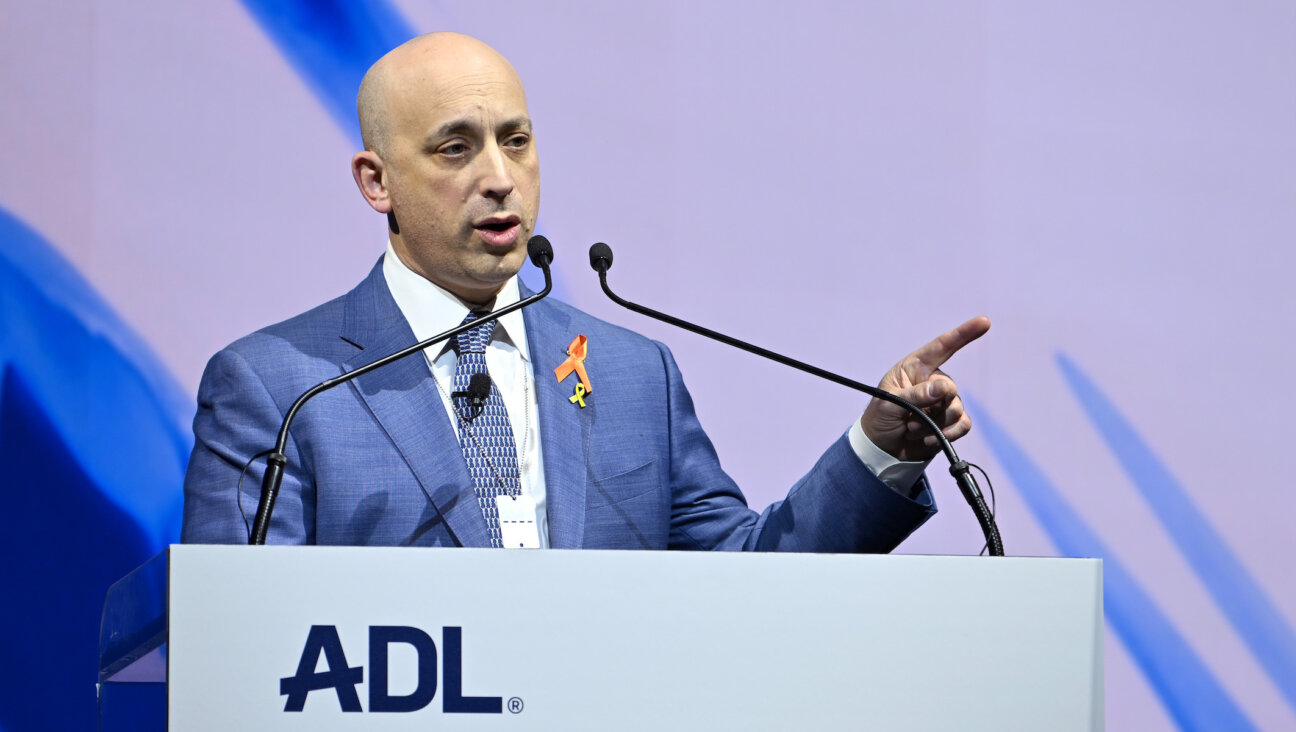
Fast Forward Noa Argamani, ADL’s Jonathan Greenblatt among over a dozen Jews on 2025 TIME 100 list
-
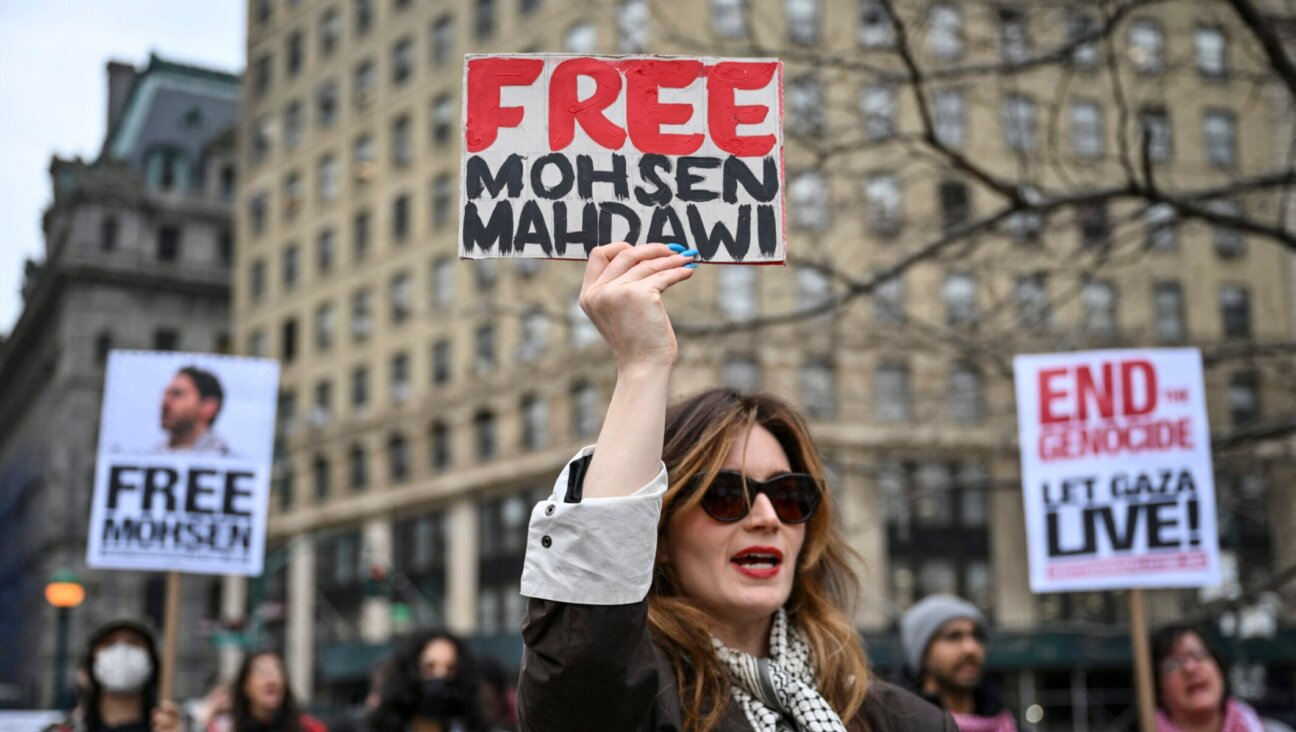
Fast Forward US claims Mohsen Mahdawi’s activism could ‘potentially undermine’ prospect of peace in Gaza
-
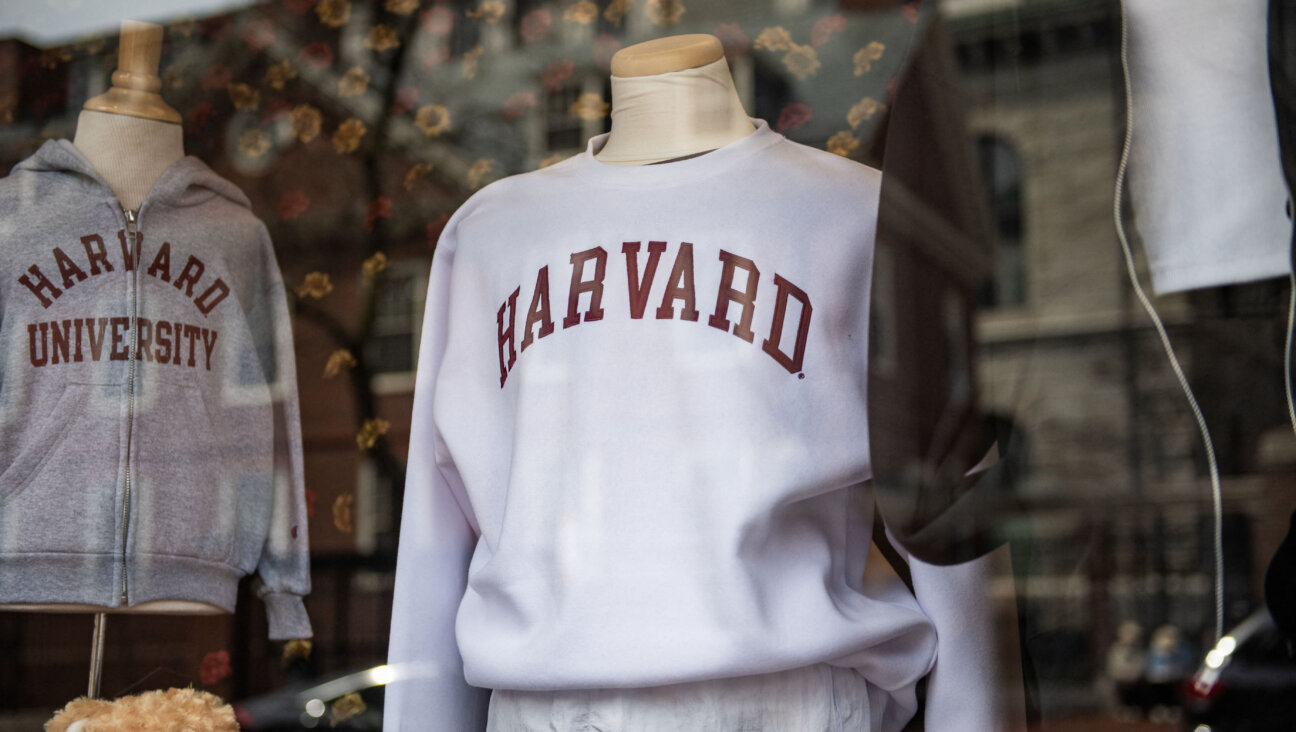
Opinion What Jewish university presidents say: Trump is exploiting campus antisemitism, not fighting it
-
Shop the Forward Store
100% of profits support our journalism
Republish This Story
Please read before republishing
We’re happy to make this story available to republish for free, unless it originated with JTA, Haaretz or another publication (as indicated on the article) and as long as you follow our guidelines.
You must comply with the following:
- Credit the Forward
- Retain our pixel
- Preserve our canonical link in Google search
- Add a noindex tag in Google search
See our full guidelines for more information, and this guide for detail about canonical URLs.
To republish, copy the HTML by clicking on the yellow button to the right; it includes our tracking pixel, all paragraph styles and hyperlinks, the author byline and credit to the Forward. It does not include images; to avoid copyright violations, you must add them manually, following our guidelines. Please email us at [email protected], subject line “republish,” with any questions or to let us know what stories you’re picking up.





